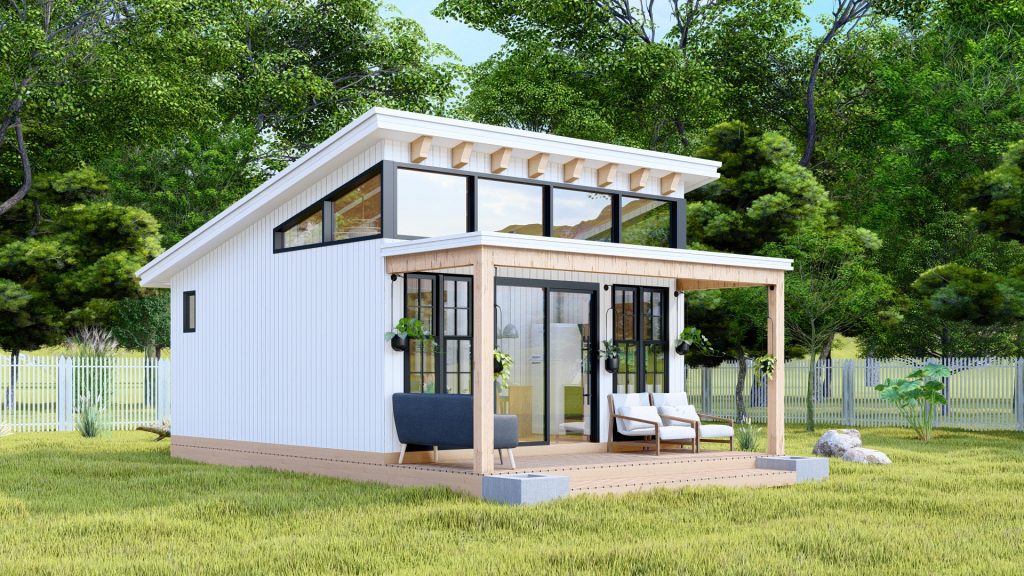Building an Accessory Dwelling Unit (ADU) in Georgia is an increasingly popular way to add value to your property, create rental income, or provide flexible living space for multigenerational households. But how much does an ADU cost to build in Georgia?
Understanding the financial landscape is essential before starting your project. In this blog, we’ll break down average costs, key factors that impact pricing, financing options, and how to make the most of your investment.
Understanding ADU Costs in Georgia
The cost of building an Accessory Dwelling Unit (ADU) in Georgia varies based on factors like size, design complexity, and site conditions. On average, homeowners can expect to spend between $150,000 and $250,000 for an ADU ranging from 400 to 750 square feet. This estimate typically includes the survey, site plan, architectural drawings, engineering, design, permitting, full project management, trenching, utilities, grading, foundation, construction, appliances, finishes, and cleaning.
It’s crucial to conduct a professional site assessment early in the planning process to determine feasibility and identify potential cost drivers, such as site grading, tree removal, septic system adjustments, or utility extensions—common considerations in Georgia’s diverse landscapes.
You can also reach out to us and we will do a free lot assessment for you — schedule it here.
For a broader context, national averages indicate that constructing an ADU can range from $150,000 to $300,000, depending on factors like location, size, and finish quality Gather ADU.
Detached ADUs typically cost more due to the need for separate foundations and utility connections, while conversions of existing garages or basements can be more cost-effective.
There are some helpful cost calculators available online to help you get a sense of build costs as well. The ADU Cost Calculator by BuildWise is a great learning tool, but please keep in mind it only calculates build costs and not other necessary expenses like survey, site plan, architectural drawings, engineering, design, permitting, project management, trenching, utilities, grading, and appliances. Also, in the calculator it has options for “basic” materials, but at Georgia ADU, we avoid any low-quality materials to ensure we can stand behind and warranty our work.
While these figures offer helpful guidelines, every ADU project is unique. Working with local experts ensures your project stays on budget, aligns with zoning regulations, and meets your long-term goals.
Key Factors Influencing ADU Costs
1. Type of ADU
- Detached ADUs: These standalone backyard homes are the most expensive to build but offer the most privacy and rental potential.
- Attached ADUs: Built onto the main house, these are often less expensive and may simplify permitting and design.
- Conversions: Converting an existing garage, basement, or attic into an ADU is typically the most cost-effective option.
2. Size and Design Complexity
The larger or more customized your ADU, the more you’ll spend. High-end kitchens, custom tile work, and separate HVAC systems all add to the final price tag. A simple, efficient layout can significantly reduce costs while still delivering functionality and style.
From a purely rational, economic point of view, it often makes sense to build the ADU up to the largest allowable size (typically 750–800 sq ft in Georgia) since it’s only marginally more expensive to add square footage. Many homeowners choose to max out their zoning entitlements because the return on investment increases with more usable space.
3. Site Conditions
Sloped lots, poor soil, or limited access for construction equipment can impact your budget. Before you build, be sure to assess any zoning setbacks, tree ordinances, or historic district limitations that could affect costs. You can also reach out to us and we will do a free lot assessment for you — schedule it here.
4. Permitting and Utility Connections
Permitting fees and utility connections vary from city to city. In metro Atlanta, these costs are often assessed in the early stages to help you prepare a realistic budget. For more, check out our Guide to Accessory Dwelling Units in Atlanta.
Financing Your ADU
The good news? You don’t have to pay for your ADU out of pocket. Here are three common financing options:
- Home Equity Loans or HELOCs: These allow you to tap into your home’s equity at a relatively low interest rate.
- Renovation Loans (Fannie Mae HomeStyle or FHA 203k): These government-backed loans are designed for home improvement projects like ADUs.
- Cash-Out Refinance: Refinance your mortgage and use the extra cash to fund your ADU.
Some homeowners also use personal loans or partner with family members who will live in the unit. Talk to a mortgage broker familiar with ADUs in Georgia to find the right financing fit—or give us a call and we can provide recommendations.
Maximizing Your Investment
Building an ADU isn’t just an expense—it’s an opportunity to build equity and unlock long-term value. Benefits include:
- Rental Income: Many Georgia homeowners earn $1,200–$2,000/month renting out their ADUs.
- Increased Property Value: An ADU can increase your home’s resale value by 20–30% in many markets.
- Flexible Living Space: Great for aging parents, adult children, guests, or a home office.
- Sustainability: Smaller footprints often mean lower utility costs and better energy efficiency.
To explore these benefits further, check out our blog on the 11 Benefits of Building an ADU.
Planning Your ADU in Georgia
If you’re considering an ADU, the first step is understanding local zoning and building codes. Not every property qualifies, so it’s essential to work with a local expert who can assess your site, manage the permitting process, and help design a unit that fits your goals and budget.
At Georgia ADU, we specialize in turn-key design and construction solutions. Whether you’re just exploring or ready to break ground, our team is here to help. From custom designs to full permitting support, we make building your ADU simple and stress-free.
Ready to take the next step? Schedule a consultation today and start planning your future ADU with confidence.
